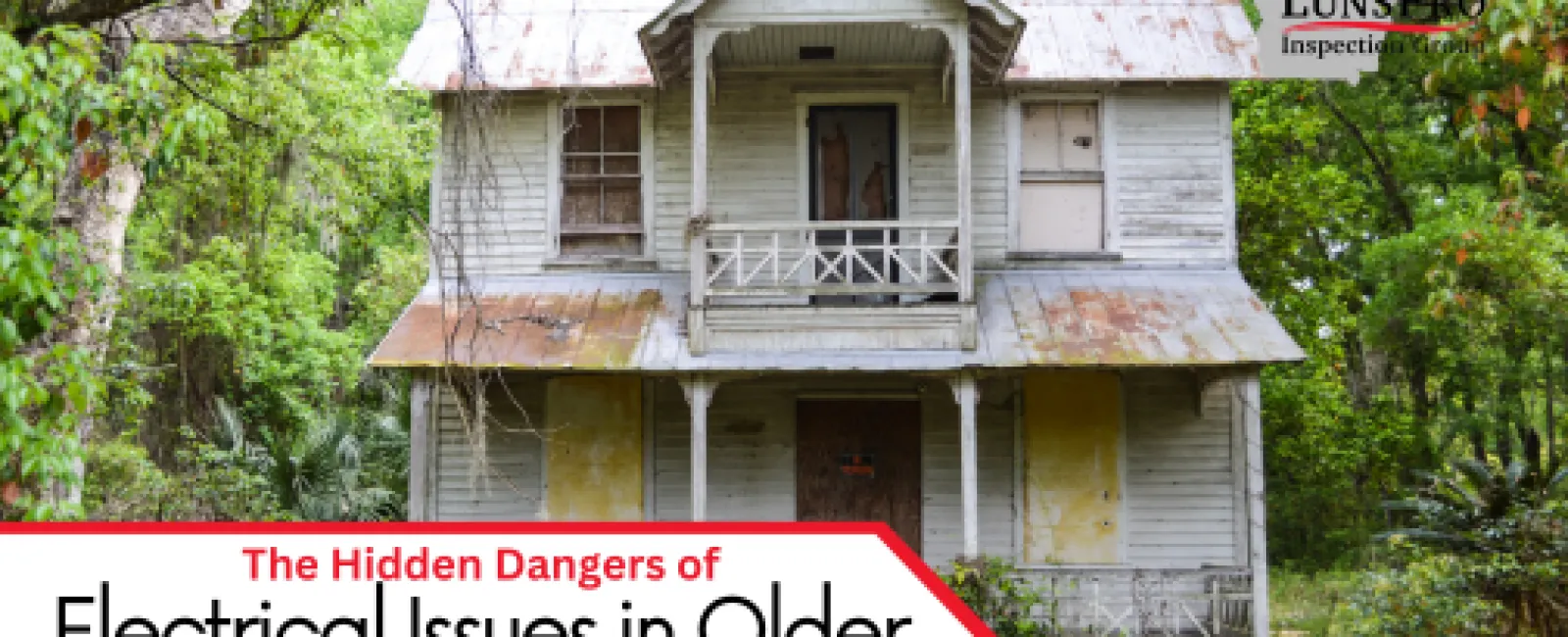The Hidden Dangers of Electrical Issues in Older Homes
Owning an older home can be a dream come true for many homeowners, offering character, history, and charm that modern houses often lack. However, behind the beautiful aesthetics and classic architecture, older homes may harbor unseen dangers—especially when it comes to their electrical systems. Faulty wiring, outdated electrical panels, and overloaded circuits pose serious risks, from fire hazards to electrocution.
At LunsPro Inspection Group, we specialize in uncovering these hidden dangers through our comprehensive Charlotte, Greensboro, and Raleigh Residential and Commercial Inspections. Understanding these risks and taking proactive measures can help homeowners maintain a safe and efficient electrical system.
In North Carolina, many homes were built decades ago when electrical demands were much lower. Today's modern appliances, entertainment systems, and smart home devices require significantly more power than older wiring systems were designed to handle. Without regular Carolina Home Inspections, homeowners may unknowingly be living with outdated electrical components that put their property and loved ones at risk. Whether you're buying an older home or have lived in one for years, recognizing the warning signs of electrical issues and addressing them promptly is crucial for long-term safety and peace of mind.
Beyond safety concerns, inefficient electrical systems can also increase energy consumption and raise utility costs. Aging wiring and outdated components may not only pose a fire hazard but can also reduce the overall energy efficiency of your home. Understanding these risks and investing in professional inspections and upgrades can enhance both safety and performance, ensuring that your home meets modern electrical standards.
Common Electrical Issues in Older Homes
1. Outdated Wiring Systems
One of the most significant dangers in older homes is outdated wiring. Many homes built before the 1960s used knob-and-tube wiring, which lacks grounding and is more susceptible to deterioration. Additionally, homes constructed in the 1960s and 1970s may contain aluminum wiring, which is more prone to overheating and potential fire hazards. A Charlotte, Greensboro, and Raleigh Home Inspection can identify these outdated wiring systems and recommend necessary upgrades.
2. Overloaded Circuits
Older homes were not designed for the electrical demands of modern living. Overloading circuits by plugging in too many appliances can cause overheating, leading to electrical fires. Common signs of overloaded circuits include:
- Flickering lights
- Warm outlets
- Frequently tripped breakers
3. Faulty Electrical Panels
The electrical panel is the heart of your home's electrical system, distributing power to different areas of the house. Many older homes still have fuse boxes or outdated circuit breaker panels, which may not meet current safety codes. Certain electrical panels, such as Federal Pacific Electric (FPE) panels and Zinsco panels, have been known to fail, leading to dangerous electrical fires. If your home has an outdated panel, upgrading to a modern circuit breaker panel is a necessary safety measure.
4. Lack of GFCIs and AFCIs
Ground Fault Circuit Interrupters (GFCIs) and Arc Fault Circuit Interrupters (AFCIs) are crucial safety devices that help prevent electrical shocks and fires. Older homes often lack these protective devices, especially in kitchens, bathrooms, and outdoor areas where moisture is present. A Carolina Home Inspection can identify whether your home has adequate protection and recommend updates to meet modern safety standards.
5. Improper DIY Electrical Work
Many homeowners attempt to fix electrical issues themselves, leading to improper wiring, overloaded circuits, and unsafe connections. DIY electrical work that does not meet National Electrical Code (NEC) standards increases the risk of fire and electrocution. A Charlotte, Greensboro, and Raleigh Residential and Commercial Inspection can uncover these dangerous DIY fixes and ensure that all electrical components are up to code.
Warning Signs of Electrical Issues
Homeowners should remain vigilant for warning signs that indicate potential electrical problems, including:
- Frequent circuit breaker trips
- Flickering or dimming lights
- Burning smells or discoloration around outlets
- Sparking or buzzing sounds from outlets or switches
- Hot or warm electrical panels and outlets
- Electrical shocks when touching appliances
If you notice any of these issues, scheduling an inspection with LunsPro Inspection Group is the best way to diagnose and resolve potential hazards before they become serious.
The Importance of a Professional Electrical Inspection
Regular Charlotte, Greensboro, and Raleigh Home Inspections are crucial for ensuring your home's electrical system is safe and up to code. LunsPro Inspection Group provides thorough inspections, evaluating all components, including:
- Electrical panels and circuit breakers
- Outlets and switches
- Wiring systems
- Grounding and bonding
- GFCI and AFCI protection
Our expert inspectors identify risks and provide recommendations to help homeowners address electrical issues before they lead to costly repairs or dangerous accidents.
Steps to Improve Electrical Safety in Older Homes
If you own an older home, consider these safety measures:
✔ Schedule a Professional Inspection - Regular Carolina Home Inspections can catch electrical issues early.
✔ Upgrade the Electrical Panel - If your home has an outdated panel, replacing it with a modern breaker system improves safety and efficiency.
✔ Replace Old Wiring - Updating to copper wiring can significantly reduce fire risks.
✔ Install GFCI and AFCI Outlets - These protective devices help prevent electrical shocks and fires.
✔ Avoid Overloading Circuits - Limit the number of high-energy appliances plugged into a single outlet.
✔ Use Energy-Efficient Appliances - Modern appliances consume less power and put less strain on your electrical system.
✔ Hire Licensed Electricians for Repairs - Avoid DIY fixes and always use qualified professionals for electrical work.
Protect Your Home with a Professional Inspection
Older homes have undeniable charm, but they also come with unique challenges—especially when it comes to electrical safety. Ignoring potential electrical hazards can lead to devastating fires, electrocution, and costly repairs. Regular Charlotte, Greensboro, and Raleigh Home Inspections conducted by professionals at LunsPro Inspection Group can uncover hidden dangers and help homeowners take proactive steps toward a safer living environment.
Beyond safety, updating your home's electrical system improves energy efficiency and boosts property value. A well-maintained electrical system ensures smoother operation of appliances, fewer interruptions due to power surges, and lower energy bills. Investing in regular inspections and necessary upgrades today can save you from costly emergencies in the future.
Whether you're purchasing a historic property or ensuring the long-term safety of your current home, an electrical inspection is a crucial step in protecting your investment and your family. Don't wait until an issue turns into an emergency—schedule your Carolina Home Inspection today and gain peace of mind knowing that your home's electrical system is up to modern safety standards.
For more information on Charlotte, Greensboro, and Raleigh Residential and Commercial Inspections, contact LunsPro Inspection Group today. Our team of expert inspectors is ready to help you keep your home safe, efficient, and up to code!

